

What Is Operant Conditioning and How Does It Work? Operant conditioning, sometimes referred to as instrumental conditioning, is a method of learning that employs rewards and punishments for behavior.
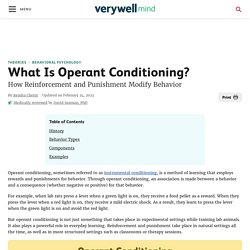
Through operant conditioning, an association is made between a behavior and a consequence (whether negative or positive) for that behavior.1 For example, when lab rats press a lever when a green light is on, they receive a food pellet as a reward. When they press the lever when a red light is on, they receive a mild electric shock. As a result, they learn to press the lever when the green light is on and avoid the red light. But operant conditioning is not just something that takes place in experimental settings while training lab animals.
The History of Operant Conditioning Operant conditioning was first described by behaviorist B.F. Through the first part of the 20th century, behaviorism became a major force within psychology. Early behaviorists focused their interests on associative learning. Types of Behaviors. Skinner’s Operant Conditioning: Rewards & Punishments. Untitled. Reinforcement vs Punishment Psychology [Examples] Reinforcement and punishment are often used as parenting tools to modify children’s behavior.
![Reinforcement vs Punishment Psychology [Examples]](http://cdn.pearltrees.com/s/pic/th/reinforcement-punishment-240473523)
Let’s review the difference between positive reinforcement and negative reinforcement, and the difference in outcomes between them. The Difference Between Positive And Negative Reinforcement In behavioral psychology, reinforcement is the introduction of a favorable condition that will make the desired behavior more likely to happen, continue or strengthen in the future1. Because the favorable condition acts as a reward, reinforcement is a reward-based operant conditioning. Untitled. Positive Reinforcement - Tips for teaching and parenting. Video reference - Positive Reinforcement. 12 Essential Tips for Positive Parenting Your Teen!herishing your Baby. Positive parenting a teenager?
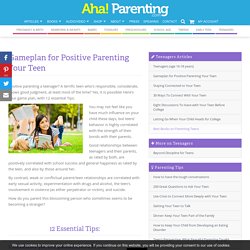
A terrific teen who's responsible, considerate, shows good judgment, at least most of the time? Yes, it is possible! Here's your game plan, with 12 essential Tips. You may not feel like you have much influence on your child these days, but teens’ behavior is highly correlated with the strength of their bonds with their parents. Good relationships between teenagers and their parents, as rated by both, are positively correlated with school success and general happiness as rated by the teen, and also by those around her. By contrast, weak or conflictual parent/teen relationships are correlated with early sexual activity, experimentation with drugs and alcohol, the teen's involvement in violence (as either perpetrator or victim), and suicide. How do you parent this blossoming person who sometimes seems to be becoming a stranger? 12 Essential Tips: 1. Does a close friendship erode your teen's respect for you?
2. Be sure to check in every single day. 3. 4. 5. 6. 7. How to Properly Use Reinforcement and Punishment - North Shore Pediatric Therapy. It starts with you. Video reference. How to Choose Consequences and Punishment for Kids. Choosing appropriate consequences is an important part of shaping your kids’ behavior.
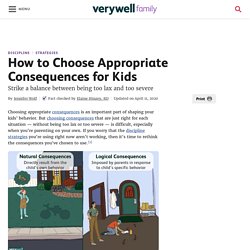
But choosing consequences that are just right for each situation — without being too lax or too severe — is difficult, especially when you're parenting on your own. If you worry that the discipline strategies you're using right now aren't working, then it's time to rethink the consequences you've chosen to use.1 Types of Consequences Appropriate consequences teach our children that they’re in control of their own behavior — even when we’re not there to nag them.2 They’re also tailored to match each child’s developmental stage, so we’re never expecting more than our kids are capable of.
These kinds of effective consequences can be divided into two categories: natural and logical consequences.3 Natural consequences are things that happen on their own as a result of the child’s behavior. Communicating with your kids upfront about consequences. Examples Infants – Infants don't need to be punished, ever. 5 Effective Punishment Strategies And Consequences For Teenagers - Parenting Boss. Your teenage child has broken a fundamental rule, and what they have done could have ended disastrously for them and others.
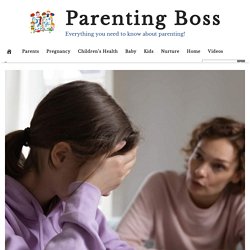
You know that they need to face the consequences for misbehavior. They should understand how wrong they were and why they should never repeat this mistake. This is where the question of punishment arises. 10 Controversial Ways Parents Have Punished Their Children. Tons of material has been created to instruct parents on how to punish their miscreant children.
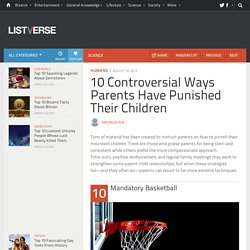
There are those who praise parents for being stern and consistent while others prefer the more compassionate approach. Time-outs, positive reinforcement, and regular family meetings may work to strengthen some parent-child relationships, but when these strategies fail—and they often do—parents can resort to far more extreme techniques. 10 Mandatory Basketball In poverty-stricken Huntingdon, Tennessee, parents are often unable or unwilling to take on an active role in raising their kids, so when behavior problems arise, these parents are at a loss for how to punish them. That’s where the Carroll Academy comes in—a day school operated by the county juvenile court and paid for by the state’s Department of Children’s Services.
How Punishing Kids Affects them as Adults. Video reference. 12 Examples of Positive Punishment & Negative Reinforcement. You might be thinking that “positive punishment” sounds like an oxymoron, after all, how can punishment be positive?
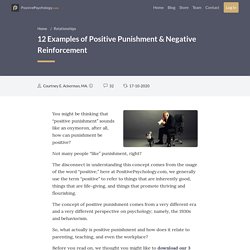
Not many people “like” punishment, right? The disconnect in understanding this concept comes from the usage of the word “positive;” here at PositivePsychology.com, we generally use the term “positive” to refer to things that are inherently good, things that are life-giving, and things that promote thriving and flourishing. The concept of positive punishment comes from a very different era and a very different perspective on psychology; namely, the 1930s and behaviorism. More parents seeking help to manage their children, Latest Singapore News - The New Paper. This article is more than 12 months old New Beyond Parental Control (BPC) cases have gone up, even as new admissions to the youth homes run by the Ministry of Social and Family Development (MSF) fell to a 15-year low last year.
There were 85 new BPC cases last year, the most since 2009, according to preliminary MSF numbers. Parents’ Guide to Beyond Parental Control Orders in Singapore. Every parent like yourself wants the best for his/her child, and sometimes loving them means going to lengths to rein in their wayward behaviour.
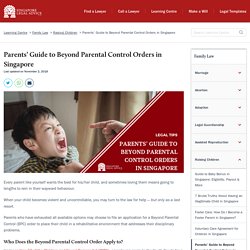
When your child becomes violent and uncontrollable, you may turn to the law for help — but only as a last resort. Parents who have exhausted all available options may choose to file an application for a Beyond Parental Control (BPC) order to place their child in a rehabilitative environment that addresses their disciplinary problems. How to Be Happy With Yourself as a Teen: 10 Steps. WikiHow is a “wiki,” similar to Wikipedia, which means that many of our articles are co-written by multiple authors.
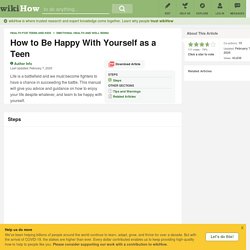
To create this article, 15 people, some anonymous, worked to edit and improve it over time. This article has been viewed 43,630 times. Co-authors: 15 Updated: February 7, 2020 Views: 43,630. Smaller families in Singapore, leading to unhealthy parenting styles. SINGAPORE: It really didn’t seem that long ago when the Stop at Two campaign was in full swing, warning parents in Singapore that “the more you have, the less they (each) get”.
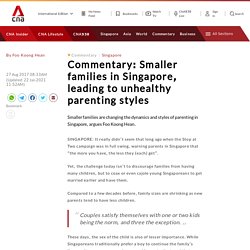
Yet, the challenge today isn’t to discourage families from having many children, but to coax or even cajole young Singaporeans to get married earlier and have them. Compared to a few decades before, family sizes are shrinking as new parents tend to have less children. Couples satisfy themselves with one or two kids being the norm, and three the exception. These days, the sex of the child is also of lesser importance. References.